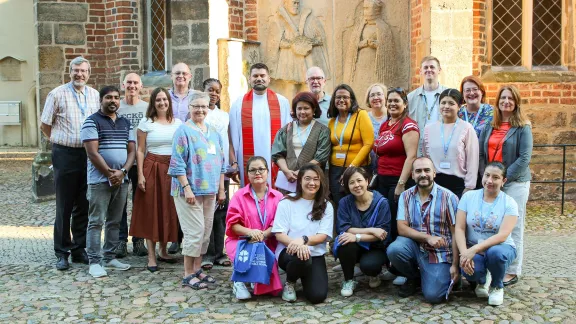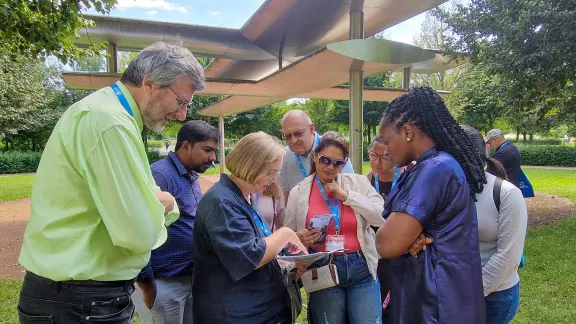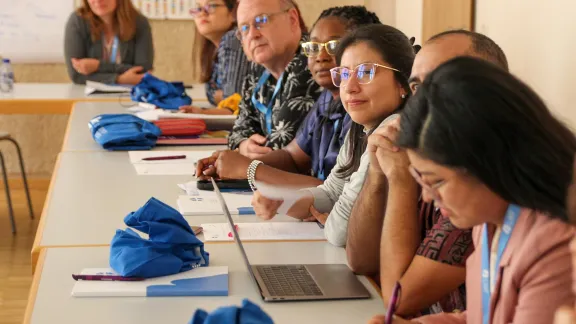
Participants and facilitators of the Seventh Lay Leaders Seminar after the Communion service in the Corpus Christi Chapel in Wittenberg, Germany. Photo: LWF/A. Weyermüller
Seventh Lay Leaders Seminar in Wittenberg and Geneva
(LWI) - This year’s Lay Leaders Seminar brings together 17 participants from The Lutheran World Federation (LWF) member churches across the globe for a time of learning, sharing, and spiritual growth.
“In our Lutheran tradition, lay people play an essential role,” says Rev. Katariina Kiilunen, LWF Program Executive for Capacity Building and Leadership Development. “We want to provide lay leaders from LWF member churches with the opportunity to reflect on the Lutheran understanding of church leadership and their vocation as non-ordained church leaders. Also, we want to provide insights into the work of the LWF and how they can effectively engage with it.”
Hosted by the LWF Center Wittenberg, Germany, the Lay Leaders Seminar started on 22 June.
“I have always wanted to go to the place where the Reformation started more than 500 years ago,” said Ms Maryan Molgo from the Evangelical Lutheran Church in Suriname. “Joining Sunday worship in St Mary’s church where Luther used to preach in his time was very special for me.”
In Wittenberg, systematic theologian Rev. Dr Regina Chan Kit-Ling and New Testament theologian Rev. Dr Klaus Schaefer provided input on the biblical and theological background of “being church”, the visible and the invisible church and the concepts of the priesthood of all believers, the ordained ministry, and New Testament perspectives on “service” and “authority.”
“It fascinated me to take the time to reflect on our Lutheran tradition and identity,” said theology student Ms Jazmin Soto Mayta from the Bolivian Evangelical Lutheran Church.
It fascinated me to take the time to reflect on our Lutheran tradition and identity.
Jazmin Soto Mayta, Bolivian Evangelical Lutheran Church

Searching for the trees planted by church representatives across the communion in Luthergarten, Wittenberg. Photo: LWF/A. Weyermüller
Fostering community
“Although we came from different backgrounds and did not know anyone else in the group, we connected quickly – after a day or two, we felt like family,” observed Ms Andrea Lindgren Oslikova from the Evangelical Lutheran Church in America. Participants exchanged leadership insights from their diverse contexts in different group settings.
The Wittenberg program included visits to the Luthergarten, a living memorial commemorating the 500th anniversary of the Reformation, and other significant Reformation sites. Seminar days were enriched with joint prayer and worship, providing a meaningful structure and fostering a deep sense of community.
“In my church, I lead the worship team,” said Mr Vino Vincent Hilda from the Christ Lutheran Church in India. “I greatly appreciated celebrating the diversity of worship and prayers in this seminar.”
From 26 June to 1 July, participants traveled to Geneva, Switzerland, to visit the LWF’s Communion Office and staff. Here, the program focuses on learning more about LWF’s strategic priorities and areas of work, including topics on the theology of peace, being in dialogue, serving the neighbor, advocacy for human rights, gender, climate and intergenerational justice, among others.
“Through this seminar, I got to know many new people and received much information about our global communion. I had not realized how big and well-connected our Lutheran family is,” concluded Ms Jodie Hoff, who chairs the Australian Lutheran World Service Board and is the principal of a Lutheran school.

Listening to a presentation on the priesthood of all believers. Photo: LWF/A. Weyermüller


